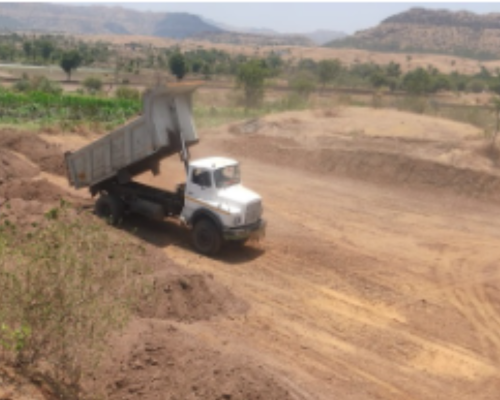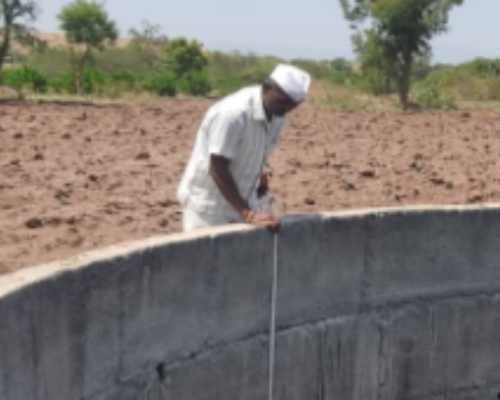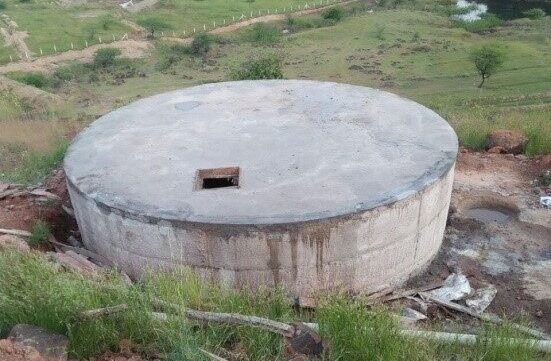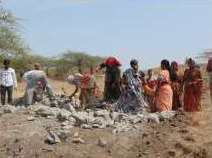
Success Stories
Sustainable Water Resource Development Project at Satalwadi
Project Rationale:
Satalwadi village is in Purandar Tehsil, where we executed the project with local participation
2022 as well as in 2023 to harvest water in the coming monsoon and provide relief to the local
community. Now, we see positive impact of last year’s conservation work.
Availability of drinking water for the villagers throughout the year, to stop the soil erosion, to
recharge ground water level, fodder availability throughout the year, protective irrigation for
rabbi crops & fruit cultivation, reduce dependency on external water resources.
Type of work – De-silting
Before capacity – 13.8 Million Lit Beneficiary
After capacity – 95.03 Million Lit
Beneficiaries Area
in Hectors – 845
Beneficiaries – 278
The silt from the Satalwadi was transported by the
farmers in their fields at the cost of transportation. They
carried a total of 8500 Cub. M. of silt, which costs Rs.
2.55 lakh. This year also people have register their
participation in the de-silting work. They had done
almost 16500 Cub. M. of de-silting and transportation
work, which cost around Rs.11.88 lakh. We spend Rs.
32 lakh CSR Funds in this project which is donated by
Praj Foundation. The total Peoples Participation is
around 37%.
We have measured the static water levels of
same wells this year also, to assess the impact of
project executed in first phase. And we found that the
wells levels have been increased by 2 to 2.5 meters.
This means that the ground water level has increased in
2023 compared with 2024.


Devrai : Forest Regeneration at Village Chambali, Tal. Purandar, Dist. Pune
“A nation that destroys its soils, destroys itself. Forests are the lungs of our land, purifying the air and
giving fresh strength to our people.”
Franklin D
Roosevelt
Project Rationale
Chambali village has a demarcated grazing land of 182 hectares. However, the tree cover on this land
is sparse and almost the entire land is barren. Efforts were made over years by the government as
well as NGOs for afforestation, but never succeeded. Due to arbitrary plantation and no preventive
measures for its growth, the saplings planted never survived. The total land of the village comprises of
1400 hectares, of which only 186 hectares is covered with forest. A group of Gram Gourav Pratishthan(GGP) volunteers, while
hiking across the hills in Chambali village in Purandar Taluka,were alarmed by the vast expanse of barren land in the vicinity of the village. They saw potential in developing at least a little part of this land into a lush green region. GGP consulted the villagers and identified Devrai as an appropriatemeasure to regenerate forest on the barren lands of Chambali
village.
- Protection and conservation of flora, fauna, forests and wildlife in the selected area.
- Afforestation and regeneration of selected area.
- Maintenance of natural ecosystem in a particular area.
- Protection of environment in order to promote sustainable development.
In order to achieve the stated objectives of the project, the following steps were undertaken since the
year 2017-18.
1. Survey and data collection from government departments in Purandar Taluka.
2. Transect walk was carried out to understand the watershed, water availability and the trees
growing in the region.
3. Afforestation on 7 hectares with 3500 trees with all preventive measures like trenching and
fencing the area to check cattle movement as well as to prevent humans from trespassing.
4. Use of “Jivamrut” (slurry) and pest control methods in the afforestation area.
Drip irrigation system was implemented for assured water supply to the saplings
5. A tank of 35,000 liters was built on a height which provided water for the drip system set up for
the plantation. This tank was filled with water from a low
lying pond with the help of electric motor. The Gram
Panchayat agreed to bear the electricity bill of this motor.
6. A caretaker was appointed for the region, who waters the
saplings at regular intervals, prevents villagers from
trespassing the area, maintains fire prevention lines, etc.
7. Meetings/discussions conducted to see the progress and
challenges faced during the execution with villagers.
8. Local participation through water conservation and
“Shramdan” in tree plantation, trenching and fencing.
9. In 2019, an adjoining area of 5 hectares was adopted and additional 2000 trees were planted.
A full-fledged growth of the grove is expected over a
span of next 10 years. However, with routine survey and
monitoring, it has been observed that 90% of the plants
have survived and there is massive growth of grass.
Aggregate participation of more than 450
farmers/students has been noted so far in various
sessions conducted on water awareness within Devrai
Project.
Use of organic practices in the Devrai project benefitted
a lot to grow the plants/trees with natural resources.
Grassland developed on the protected area where we can see different types of shrubs. Due to
development of the grassland, evaporation losses minimized to some extent. Mortality ratio of plants
slowed down in the second year in comparison to the first year. Fire prevention lines created along
the fence helped prevent forest fires during summer from entering the area.
As years are passing, people seem to trust the Devrai project and foresee a well grown forest land in
the vicinity of the village. The villagers have even been assured that after substantial growth of the trees, the area would be open for grazing in a few years
Chambali Village Panchayat has played an integral role in gathering people, instilling a sense of
belonging in the community and encouraging human resources from the localities for participation in
the project.
Gram Gaurav Pratishthan is grateful to its donors, Rama-Purushottam Foundation, Pune for the
generous grants towards this project, that helped achieving the envisaged objectives.



Rehabilitation of Water Conservation Measures: Kumbharwalan, Tal. Purandar, Dist. Pune
“The future of India lies in its villages”
Mahatma Gandhi
Project Rationale
Gram Gaurav Pratishthan (GGP) saw this statement from the perspective of environment conservation and water management. The government has been implementing measures for watershed conservation under various isolated and integrated watershed development schemes in 52 villages of Purandar Taluka. A similar scheme was proposed for Kumbharwalan village in Purandar Taluka. But it was observed by GGP that the water shortage in this drought-prone region can be tackled by repairing the old structures in the village instead which could be executed within a short time span with little investment.
With an average annual rainfall of less than 300mm in the village of Kumbharwalan, there used to be acute water shortage in the region. Thus, villagers had to depend on water tankers for their daily needs from November end till June, the succeeding year (i.e. 6 months every year). Two tankers, costing approximately Rs.
1500/- each, were required every day. The total expenditure of the village on tankers every year amounted close to 5.5 lakh rupees in year 2013-14.
- 1. Creating assurance of drinking water for villagers throughout the year
- 2. Providing protective irrigation to 100 hectares of land
- 3. Making water available of water for fruit cultivation
- 4. Ensuring availability of fodder throughout the year
In order to achieve the stated objectives of the project, following steps have been undertaken since the year 2013-14.
- 1. Meetings/discussions conducted during the execution with villagers;
- 2. Local participation through “Shramdan” and monetary contribution;
- 3. Awareness created on water conservation through various activities resulted in the people; contribution for silt transportation, stone pitching etc.
- 4. Desilting and repairs of 14 earthen/cement bunds through earthwork of 15,158 cubic meters;
- 5. Tree plantation drives;
- 6. Sessions organized for villagers on organic farming and organic pest control methods;
- 7. Sessions organized on the concept of Water Budget for the villagers; Rain gauge fixed in the village to understand the rainfall pattern and move towards the optimum use
of available water;
- 8. Display Board installed in the village to update/understand the water source and availability
After desilting and repairing earthen structures and bunds, the immediate impact was observed in the form of increase in storage capacity of water in the village, from 144.47 lakh liters to 574.70 lakh liters. The water levels in 130 wells and 69 bore wells increased. 437 hectares of land became water self- sufficient, benefitting 276 families.
Even though the average rainfall was 300mm since 2014 till 2018, Kumbharwalan is now water tanker free.
In March 2013, a study initiated by GGP volunteers showed that 11.4 hectares of land was under fruit cultivation, majorly Custard Apple. Now this cultivation has increased to 56.7 hectors of land as of March 2019. Farmers have moved to cultivating other fruits like Guavas, Pomegranates, Chikkoo, etc.
In 2019, the annual rainfall was approximately 870mm which had a positive impact on the groundwater levels. Though it caused damage to the Kharif crops, villagers have been able to redeem their losses through better crop-management as they cultivate a variety of crops throughout the year.
In January 2021, GGP conducted another survey and interviewed farmers in Kumbharwalan. The then Sarpanch of the village said that the village hasn‟t required a water tanker since 2014 and is water self-sufficient. To everyone‟s surprise, they have surplus water to cultivate not only Rabi Jowar and Wheat but also water intensive crops like Onion and Paddy in the month of February. There is sufficient fodder for cattle in the village and farmers don‟t have to bear extra cost to buy fodder, now.
Continuous conduct of awareness programs and discussions on water management and organic farming has benefitted over 1500 participating farmers and students. Sustainable farming processes have helped reduce the farming cost.
The success was achieved through harmonious execution of trilateral inputs. People‟s contribution was brought about. Beneficiaries provided stones and participated in pitching stones of the waste weir of the bunds. They helped in excavating the soil and carried the silt to their farms at their own expense. The monetary contribution of these beneficiaries amounted to Rs.5.32 lakhs. The technical support required for the execution of this project including surveying, design, estimation, supervision and monitoring was the responsibility of GGP. GGP was also engaged in resolving the issues of the local farmers.
Gram Gaurav Pratishthan is grateful to its donors, Rotary Club, Kothrud, Pune for the generous grants towards this project, that helped achieving the envisaged objectives.


